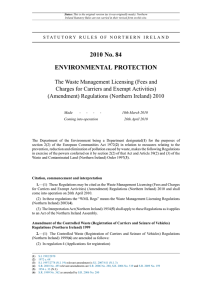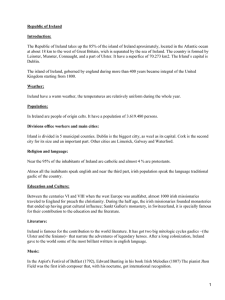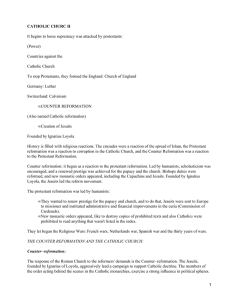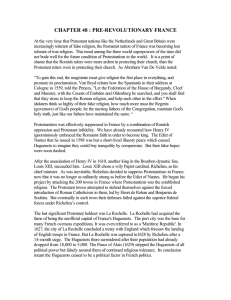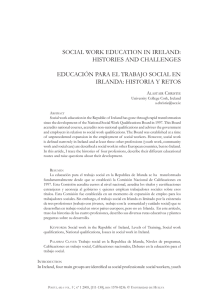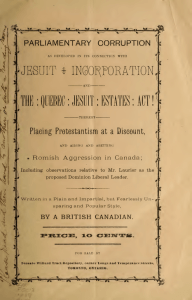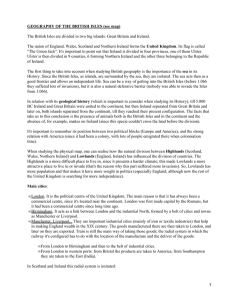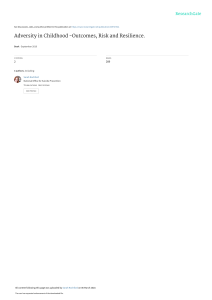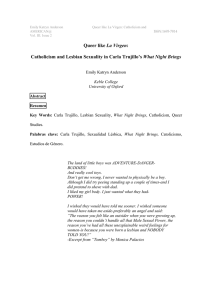Christianism
Anuncio
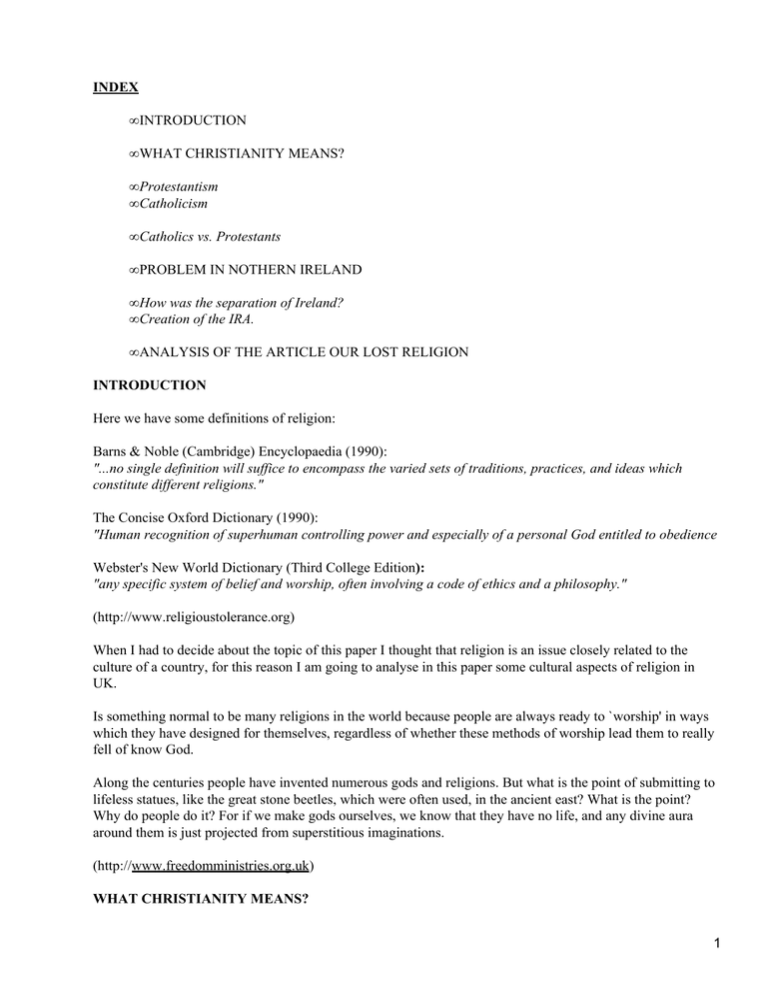
INDEX • INTRODUCTION • WHAT CHRISTIANITY MEANS? • Protestantism • Catholicism • Catholics vs. Protestants • PROBLEM IN NOTHERN IRELAND • How was the separation of Ireland? • Creation of the IRA. • ANALYSIS OF THE ARTICLE OUR LOST RELIGION INTRODUCTION Here we have some definitions of religion: Barns & Noble (Cambridge) Encyclopaedia (1990): "...no single definition will suffice to encompass the varied sets of traditions, practices, and ideas which constitute different religions." The Concise Oxford Dictionary (1990): "Human recognition of superhuman controlling power and especially of a personal God entitled to obedience Webster's New World Dictionary (Third College Edition): "any specific system of belief and worship, often involving a code of ethics and a philosophy." (http://www.religioustolerance.org) When I had to decide about the topic of this paper I thought that religion is an issue closely related to the culture of a country, for this reason I am going to analyse in this paper some cultural aspects of religion in UK. Is something normal to be many religions in the world because people are always ready to `worship' in ways which they have designed for themselves, regardless of whether these methods of worship lead them to really fell of know God. Along the centuries people have invented numerous gods and religions. But what is the point of submitting to lifeless statues, like the great stone beetles, which were often used, in the ancient east? What is the point? Why do people do it? For if we make gods ourselves, we know that they have no life, and any divine aura around them is just projected from superstitious imaginations. (http://www.freedomministries.org.uk) WHAT CHRISTIANITY MEANS? 1 World religion derived from the teaching of Jesus, as found in the New Testament, during the first third of the first century. Nowadays it has about one billion of membership, and is divided into groups or denominations that differ in some spheres of belief and practice. Its main divisions are the Roman Catholic, Eastern Orthodox, and Protestant churches. Beliefs: Christians believes in one God with three aspects: God the Father, God the Son (Jesus) and God the Holy Spirit. According to the Christian belief God created everything that exists and showed his love for the world by coming to the Earth as Jesus, and suffering and dying in order conciliate humanity to himself. Christians believe that three days after his death by crucifixion Jesus resurrects by God's power, appearing may times in bodily form to his followers. Now, after having defined what is Christianity, we focused on two parts of this religion: Protestantism and Catholicism. (http://ebooks.whsmithonline.co.uk) Protestantism in England History England have been traditionally Catholic. It supported Rome during papal schism of 14th Century, rather than favouring the alternative Pope in Avignon. But in the 16th Century all changed. In 1519 Martin Luther King starts the Reformation; there have been theological disputes about nature of salvation, whether man had any control over it, or just God's gift. He decides that God only giver the salvation to humans because Jesus Christ had died on the cross thus expunging our sins. This was considered heresy. Roman Catholics `leaders' were not slow to react. Luther's complaints led to a division in Church, between loyal Catholics, and Protestants. In England Henry VIII originally defended papacy, granted the title Fidei Defensor by Pope, not until 1530s that relationship with Rome changed. The problem was that Henry wanted to divorce his first wife Catherine of Aragon, for not producing a male heir. Pope refused annulment on ground of consanguinity. So The King separate Britain from Rome, forming an independent state with himself at the head of the church, the Church of England. Henry was not a protestant bur a schismatic Catholic. Later, Edward VI the Minor, ensured that Anglicanism was more Protestantism than Catholicism. But in 1553 when Mary (married with Philip II, king of Spain) reach the Reign. England returned to Rome. This was a time of confusion; Protestants were persecuted. However, in 1558 Elizabeth succeeded Mary and England was protestant again. (http://www.warwick.ac.uk) Branches and Sects Two distinct branches of Protestantism grew out of the Reformation. The evangelical churches in Germany and Scandinavia were followers of Martin Luther, and the reformed churches in other countries were followers of John Calvin and Huldreich Zwingli. A third major branch, episcopacy, developed in England. Particularly since the Oxford movement of the 19th cent., many Anglicans have rejected the word Protestant because they tend to agree with Roman Catholicism on most doctrinal points, rejecting, however, the primacy of the pope (England, Church of; Episcopal Church; Ireland, Church of). Central Beliefs 2 The main characteristics of original Protestantism were: the acceptance of the Bible as the only origin of trusty revealed truth, the belief in the universal priesthood of all believers, and the doctrine that a Christian is justified in his relationship to God by faith alone, not by good works or dispensations of the church. There was a tendency to minimise liturgy and to emphasise preaching by the ministry and the reading of the Bible. Although Protestants denied asceticism, a high standard of personal morality was advanced; in some sects, notably Puritanism, a high degree of austerity was reached. Their ecclesiastical polity, principally in such forms as episcopacy (government by bishops), Congregationalism, or Presbyterianism, was looked upon by Protestants as a return to the early Christianity described in the New Testament. (http://www.dwilliamso.pwp.blueyonder.co.uk) Catholicism in UK Attending to the Greek roots of the word, it means according to (kata) the whole (holos). In the ancient Church, it was used to refer to a single, visible communion, separate from others, bonded together through faith in Jesus Christ. According to St. Cyril of Jerusalem: "The Church is called Catholic, because it teaches universally and infallibly each and every doctrine which must come to the knowledge of men, concerning things visible and invisible, heavenly and earthly, because it brings every race of men into subjection to holiness, because it universally treats and heals every class of sins, and because it possesses within itself every conceivable form of virtue, in deeds and in words and in the spiritual gifts of every description." The Church has always considered Herself since our earliest roots to be blessed by God, through Jesus. And because of that gift, she is a community of mission: the mission of the Gospel. (http://catholicism.about.com) The denomination of `Catholic' was established in the second century. It is referred to the Roman Church guided by the Pope. Beliefs Catholic belief can be summarised in the profession of faith or the Nicene Creed, which had promulgated in the year 325 at the first Ecumenical Council of the Catholic Church (The Council of Nicea). According to the creed, Catholics affirm the belief in Triune God, Father, Son and Spirit, and the absolutely belief in the one, holy, catholic and apostolic Church, and finally the hope of resurrection and eternal life. (http://catholicism.about.com) NORTHERN IRELAND HOW WAS IT THE SEPARATION OF IRELAND? Until 1919 the combined area of nowadays Ireland and Northern Ireland was a single country ruled by the British. The most majoritary Religion in what I now Northern Ireland was Protestantism, oppositely in what is now Ireland the one most majoritary was Roman Catholicism. The British government had proposed that Ireland and Britain remained united but each one taking control of its own domestic affairs. However most northeastern province of Ulster´s Protestant did not agree with this because they did not want to be a minority in a Roman Catholic Nation. 3 CREATION OF THE IRA Because of that, an unofficial military Force was created, The IRA; it aimed to get independence for Ireland. In 1919, the IRA began a guerrilla war for independence from British rule. In 1920, the British government passed the Government of Ireland Act. It divided Ireland into two states. The six northeastern counties were separated from the rest of Ireland and became Northern Ireland. The southern Catholic majority refused the act and asked for a single, united Irish republic.. The guerrilla war continued until the approval of the Anglo−Irish Treaty and the declaration of truce by British and Irish leader in July 1921. (http://www.worldbook.com) In Northern Ireland, Religion has a huge influence on local life − 54% of the population are protestant and 42% are Roman Catholic. Religion has also determines the social background of most people. It impacts on many aspects like education (what school they attend), hobbies (what sports they play), political ideas (political parties they support)... Most Protestant want Northern Ireland remain part of UK and would support unionist or loyalist parties. Most Catholics, however want a united Ireland and would support the nationalist or republican parties. (http://www.belfasttelegraph.co.uk) We can see that the Northern Ireland Problem has two faces. The political one and the religious one. The hatred that fuels the centuries−old conflict in Ireland is not, of course, just about how Christians name their faith. It has its bitter seeds in political oppression and revolt, in poverty and arrogance, in pride and strength. Its roots are entwined in the complexity of conflicts in Irish culture, mindset and history and only time will tell wether today's new government cam begin to remove this cancer without killing the patient. (Pat Grauer) ANALYSIS OF THE ARTICLE OUR LOST RELIGION The atheist may cheer the exit from organised religious belief, but there is no virtue in wholesale ignorance(Polly Tonybee) In this article Our lost religion Toynbee tell some interesting ideas. He asks himself: How can people look at a painting or sculpture or read a book o f previous centuries or understand anything about history if they do not know this most essential Christian story let alone the difference between a Catholic and a Protestant? Without a basic knowledge of Christianity the past is a closed book.(Polly Toynbee) Religion plays an important role in the culture and history of any country. UK is not taken away from this. Toyobo thinks that it is important to know some about religion, since many facts occurred in the world becomes meaningless without his knowledge. The writer quotes an expample. 4 The points that is impossible to explain the politics of Middle East or India and Pakistan without some notion of Judaism, Islam and Hinduism. Neither can have sense the conflicts that British are helping police in the Balkans without taking into account the difference between religions that act as artificial ethnic identifiers. Religion influences in all the country's factions: policy, history, education, society... For Toynbee is curious how British government sticks to religion, the most secular nation ((48%) proclaim no particular religion, only 7% are Christians churchgoers and 3% practising Muslims and Hindus), yet a Cool Britannia leadership anxiously courts its ragged pieces. They chase after religion as if it were a short cut to the national soul. As I have said before religion has influence in policy. The writer treats this topic too. He says that the power of religion in the constitutions is increase, not shrunk, in anew House of Lords where the 25 bishops joined by guaranteed seats for other faiths. My conclusion can be summarised in one question: Are people really aware o what means religion for a country? BIBLIOGRAPHY http://www.religioustolerance.org/rel_defn.htm http:// www.freedomministries.org.uk/masters/religion.sthml http://ebooks.whsmithonline.co.uk/encyclopedia/40/M0003440.htm http://www.warwick.ac.uk/fac/arts/CAS/teaching/eash1.htm http://www.dwilliamso.pwp.blueyonder.co.uk/protestantism.htm http://catholicism.about.com/religion/catholicism/library/weekly/blcathfaq.htm http:// catholicism.about.com/religion/catholicism/library/weekly/blbelieve2.htm http://www.franciscanmonk.frs.com http://www.belfasttelegraph.co.uk/niguide/whatisin.html http://www.worldbook.com/fun/bth/ire/html/republisht.html Pat Grauer What do you Throw to a Drowning Protestant? http://protestantism.ninngco.com/religion/protestantism/library/weekly/aa12029.htm http://Polly Toynbee Our lost Religion Friday April 13,2001 The Guardian http://guardian.co.uk/religion/story/0,2763472717,00.html 5 2 7 6

